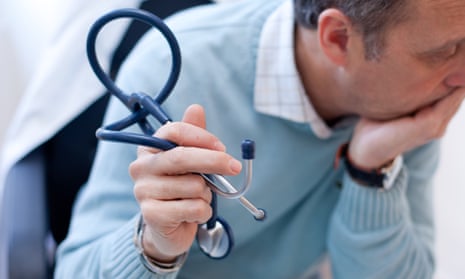Doctors are turning to drink, binge-eating and prescribed drugs to cope with the mounting stresses of their jobs, research reveals.
Large numbers of doctors are troubled by sleeping problems, fatigue and headaches because workloads have become so heavy. And more than half of all medics (55%) are suffering from burnout, from the emotional exhaustion of their jobs.
The grim picture of UK doctors’ mental and physical wellbeing is detailed in findings published on Thursday in the BMJ Open medical journal.
It shows how hard doctors find it to switch off from the responsibilities involved in caring for patients. Six in 10 (61%) think about work when they go to bed, while 49% have trouble sleeping if they postpone tasks.
Academics at Birkbeck College in London and University College London found that one in three medics used alcohol to feel better, and one in five to cope with a stressful event, while 5% were dependent on drink.
The results are based on questionnaires completed by 417 UK doctors, which reflect the makeup of the country’s 251,000 practising medics.
“Our research shows that 55% of doctors have burnout and this has real health consequences. Doctors are not to blame for having burnout. It is a normal, human reaction to external stressors. Losing even one doctor is a great loss for the NHS,” said Dr Caroline Kamau, who co-led the study.
More than two in five (44%) respondents said they used drugs, though they were mainly antidepressants and painkillers and herbal, homeopathic and over-the-counter medications rather than illegal substances such as cocaine.
Many doctors have dysfunctional eating habits too. A third (35%) said they ate large amounts of food even when not feeling physically hungry, while 28% felt disgusted, depressed or very guilty about overeating.
Dr Julia Patterson, the lead for EveryDoctor, which campaigns to improve working conditions for medics, blamed doctors’ high stress levels on chronic underfunding and understaffing in the NHS.
“It’s impossible for doctors to effectively recover from a period of burnout currently,” she said. “Even if they seek help and take time out of work to recover, they return to an unbearably stressful work environment the day they return to work. They enter an inescapable cycle of stress and burnout.”
Backache, eye strain, heartburn and nausea afflict between one in five and one in three medics, according to the research, which investigated the effects of “occupational distress” on the health of doctors.
A third of doctors also reported having “psychiatric morbidity” – mental ailments such as anxiety, depression or post-traumatic stress disorders.
About 1,000 family doctors a year seek help from the GP Health Service, which supports them with issues including burnout, stress and dependence on drink or drugs. It has worked with more than 2,200 GPs and trainee GPs since it launched in late 2016 and has about 1,600 medics on its books.
GP leaders say family doctors need to receive more psychological support to help them cope with the demands of their working lives, especially in light of an apparent rise in the risk of them killing themselves.
A recent British Medical Association survey of 4,300 medics found that junior doctors suffer the highest burnout rate across the medical profession at 91%. GP partners, who co-own surgeries, came second, on 88%.
The NHS long-term plan published in January committed the health service in England to doing more to help all staff cope better with the demands of their job, for example through better access to flexible working.
